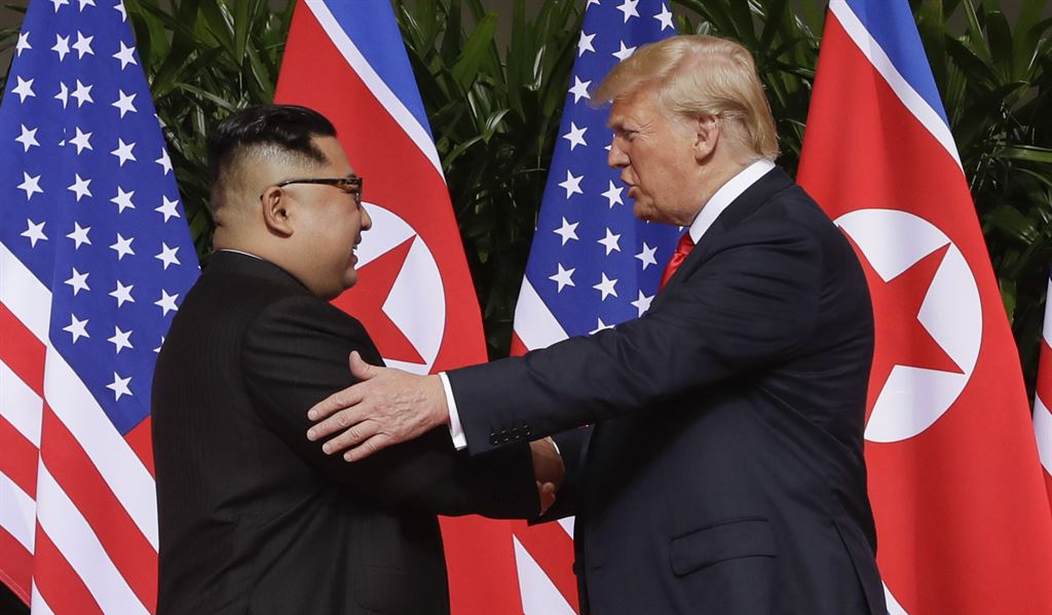As 2018 began, Kim Jong Un's North Korean dictatorship was touting its ICBMs. Many weapons analysts believed North Korean ICBMs could strike Seattle and San Francisco.
As 2018 began, North Korean leaders routinely threatened South Korea, Japan and the U.S. with nuclear attack. In January, Kim claimed would soon deploy nuclear warheads. Propaganda is one thing but North Korea has a documented, decades-long record for vicious, unprovoked conventional military attacks, assassinations, terror attacks and paranoid violence.
As 2018 began, the Trump administration swore Kim's vicious regime would never be allowed to possess operational nuclear weapons. A Pyongyang armed with nuclear weapons capable of hitting North America would radically alter the strategic security situation throughout the entire Pacific Ocean basin.
As 2018 began, the Trump administration repeated its 2017 "coercive diplomatic" demand: Kim would either "denuclearize" and submit to rigorous inspection and verification or he and his regime would be destroyed. The U.S. summarized its demand with an acronym, CVID: Complete, Verifiable and Irreversible Denuclearization.
Finally, as 2018 began, the Korean War continued. Remember, the Korean War isn't over. The 1953 armistice isn't a peace treaty. North and South Korea are still at war.
As 2018 ends, the Korean War continues. However, during 2018 a small but palpable change in diplomacy occurred, one that may lead to something other than conflagration. Given the consequences of renewed all-out war in Korea -- both the massive physical destruction and the global economic depression that would follow -- the slight change is significant.
Recommended
I think you can make the case that the minimal change is the biggest foreign policy and international security story of 2018.
June 2018's Singapore summit where Trump met Kim is indicative of the diplomatic alteration. However, it was part of a larger American diplomatic effort that began in February 2017. In March 2018, Kim told a South Korean delegation he was willing to discuss denuclearization. He did something very unusual; he made no demand of South Korea and the U.S. other than that they discuss the subject face to face. That was a hint that Trump administration's diplomacy and military displays had given Kim a new perspective.
In Singapore, a sketch of a very peculiar deal emerged. North Korea's young, flabby, criminal dictator would exchange his nukes for American, South Korean, Japanese and Chinese investment, and the promise that he would live to enjoy his nation's economic success.
The peculiar deal could lead to a Korean War peace treaty, though that's speculation. This isn't: As 2018 ends, the Kim regime continues to refrain from testing ICBMs and nuclear devices, a promise Kim made in April before a meeting with South Korean President Moon Jae-in. At the time he also said tests were no longer required since North Korea had "proven" missile and nuclear technology.
The halt indicates tentative engagement in a longer negotiation. It could end in an instant fit of pique. In November, North Korea claimed it tested a "hi-tech" tactical weapon. Pyongyang recently said it is "impatient" with U.S. and international sanctions.
In December, another event indicated all is not lost: South Korean railroad experts conducted a close inspection of North Korean railroads. Over two weeks, a South Korean train crept along some 2,000 kilometers of North Korean track, gathering highly granular data on North Korean rail infrastructure and verifying its miserable condition.
Pyongyang wants Seoul to help rebuild its railroads. South Korea says it will -- after denuclearization. Denuclearization requires inspection and verification within the secretive North Korea. Paranoid North Korea let South Korean railroad experts inspect and verify. Was it a tentative first step toward accepting the nuclear weapons inspection and verification regimen CVID requires? Perhaps 2019 will tell provide a few more clues.

























Join the conversation as a VIP Member